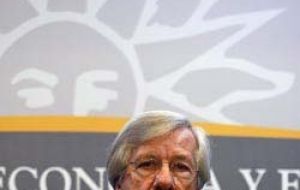MercoPress. South Atlantic News Agency
Uruguay tries more orthodox economics to tame inflation
 Minister Danilo Astori: “inflation is under control”
Minister Danilo Astori: “inflation is under control” Uruguay's government launched this week a package of seven price-cutting measures on goods and services aimed at containing, which rose to 8.2% in the first eight months of the year far above the annual target of 6.5%.
The anti inflation measures include cuts to electricity and telephone bills, monthly health insurance payments and fuel, all government managed prices mainly through government owned public utility companies. But the government also listed in the measures stepping up imports of vegetables, exempting chicken from value-added tax until the end of the year and scrapping a tax paid by public companies on foreign currency purchases. "We're sure that these seven measures are going to have a significant impact in attenuating the price increases we've suffered in recent months" indicated Economy Minister Danilo Astori, who nevertheless insisted "inflation was under control" since temporary factors such as high international prices and adverse weather factors were to blame. "They'll have a short term impact". Last week Astori was summoned to Parliament to defend a recent fiscal reform and was also questioned about consumer prices inflation. In spite of the grueling the government's majority ensured the event had no political consequences, but the combination of the fiscal reform and ballooning food prices is having a significant support cost revealed public opinion polls. Inflation in 2006 was 6.38% and the Central Bank's target for 2008 is between 4 and 6%. For the government keeping prices below double digit is essential since that is the benchmark, agreed with labor unions, which turns annual salary adjustments into six months or quarterly rounds. This is particularly threatening for a Socialist oriented coalition (from former guerrillas and Communists to Christian Democrats) with an economic team (mainly US educated) which so far has strictly followed open market economics, with more orthodox fervor than its conservative predecessors. Under the steps announced on Monday the government owned energy monopoly will cut prices by an average 4.3% and a planned price hike for January 2008 will be postponed until July. Fuel costs will fall an average of 2% and the private health quota drops between 2 and 2.5%. Telephone local calls will be lowered 6%. Last March Uruguay's Central bank launched a series of measures aimed at stemming rising consumer prices, but economic analysts said last week they had not been enough to slow inflation. One of those measures was to cut liquidity which helped to appreciate the Uruguayan currency against the US dollar, a decision criticized by export industries exposed to the double squeeze of higher costs and less income. Reliable government sources also admitted that the reductions will be financed from the primary budget surplus. However from Washington the International Monetary Fund said inflation was a challenge for Uruguay's policy-makers but overall remained optimistic about economic growth prospects for the country in 2007. "Growth momentum remains solid this year, led by foreign investment and consumption and supported by an accommodative monetary policy stance," the IMF said in its annual health check of Uruguay's economy. To reign in inflation, the IMF said, Uruguay authorities should allow interest rates to adjust freely to the monetary tightening. "(IMF) directors generally saw scope for clarifying the objectives and instruments of monetary policy, including foreign exchange intervention, to help enhance the effectiveness of monetary policy in the face of large capital inflow," it said. IMF said adopting an inflation target should proceed gradually, especially given the high circulation of dollars in the economy. It suggested authorities allow for some additional reserve buildup as they tackle inflation.




Top Comments
Disclaimer & comment rulesCommenting for this story is now closed.
If you have a Facebook account, become a fan and comment on our Facebook Page!